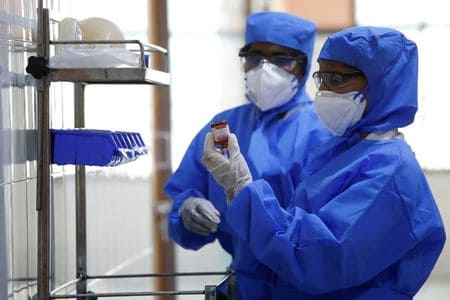By Chris Thomas and Neha Dasgupta
BENGALURU/NEW DELHI (Reuters) – India, the world’s main supplier of generic drugs, has restricted the export of 26 pharmaceutical ingredients and the medicines made from them, including Paracetamol, a common pain reliever also sold as acetaminophen, as the coronavirus outbreak plays havoc with supply chains.
The Indian government urged calm and said there were enough stocks to manufacture formulations for two-to-three months.
The government’s list of 26 active pharmaceutical ingredients (APIs) and medicines accounts for 10% of all Indian pharmaceutical exports and includes several antibiotics, such as tinidazole and erythromycin, the hormone progesterone and Vitamin B12.
It was unclear how the restriction would impact the availability of these medicines in the countries that import from India and also depend on China. In the United States, for instance, Indian imports accounted for 24 percent of medicines and 31 percent of medicine ingredients in 2018, according to the U.S. Food and Drug Administration.
FDA Commissioner Stephen Hahn told U.S. senators on Tuesday that the agency is working to determine how the restrictions will affect the U.S. medical supply and the effect on essential medicines.
The FDA last week announced the first coronavirus-related drug shortage in the United States but declined to name the drug in question. Hahn said on Tuesday that drug was in shortage because of a lack of materials needed to make the API.
Indian drugmakers rely on China, the source of the virus outbreak, for almost 70% of the APIs for their medicines. Industry experts say they are likely to face shortages if the epidemic drags on.
“Export of specified APIs and formulations made from these APIs… is hereby ‘restricted’ with immediate effect and till further orders,” the Director General of Foreign Trade said in a statement https://dgft.gov.in/sites/default/files/Noti%2050_0.pdf on Tuesday, without explaining the extent of the restrictions.
“Irrespective of the ban, some of these molecules may face shortages for the next couple of months,” Dinesh Dua, chairman of the Pharmaceuticals Export Promotion Council of India, told Reuters. The council falls under the federal commerce ministry.
“If coronavirus is not contained, then in that case there could be acute shortages,” Dua said.
In a statement, the Indian federal government said state authorities had been asked to monitor the production and availability of APIs and formulations to prevent black marketing and hoarding.
U.S. drugmakers have said they are monitoring their supply chains and Mylan NV <MYL.O> warned last week that there could be drug shortages. Eli Lilly and Co <LLY.N> said on Tuesday it does not expect the coronavirus outbreak to result in shortages for any of its therapies, including insulin products.
INDIA MONITORING PATIENTS
Separately, the Indian government said on Tuesday it had detected “high viral load” in six people who had been in contact with a patient who contracted the virus in New Delhi, the capital.
The patient in New Delhi was being monitored and was stable, the government said.
The six people have been kept in isolation and their samples are being sent to India’s National Institute of Virology for confirmation, the government said in a statement https://pib.gov.in/PressReleseDetail.aspx?PRID=1604938.
Prime Minister Narendra Modi sought to quell public fears. “There is no need to panic,” he said in a tweet.
“Had an extensive review regarding preparedness on the COVID-19 Novel Coronavirus. Different ministries & states are working together, from screening people arriving in India to providing prompt medical attention,” he added.
(Reporting by Neha Dasgupta in New Delhi and Chris Thomas in Bengaluru; Additional reporting by Derek Francis in Bengaluru and Devjyot Ghoshal in New Delhi; Editing by Barbara Lewis, Pravin Char and Dan Grebler)


